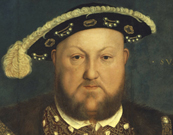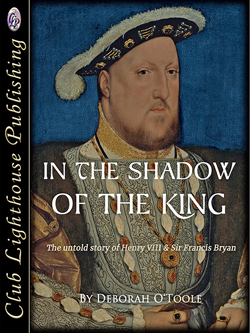EXCERPTS
THE KING FELT well enough to go on a lengthy progress in the summer of 1541, his entourage almost as large as the one he had taken to the Field of the Cloth of Gold in France some twenty-one years earlier. The current display was meant to impress Henry's subjects, which it did not fail to do. The King seemed more popular with his people than ever before, eliciting cries of welcome from residents in every town they came to.
The royal retinue contained five thousand horses, one thousand soldiers, members of the court including Queen Katherine and Lady Mary, and two hundred tents and pavilions to be used by everyone else when there was no remaining space in the houses the royals stayed in along the way.
They began in Hatfield, and then continued on to Dunstable and Ampthill - with much hunting and hawking as they went - stopping for a few days at Grafton Manor in Worcestershire because heavy rains had made muddy roads impassable. When the weather cleared, they went to Stamford, then Grimsthorpe Castle in Lincolnshire as guests of the Duke of Suffolk, then on to Lincoln, Boston, Doncaster, Pontefract, Hull, Kettleby, Collyweston, The More, Windsor, and finally, back to Hampton Court on October 30th.
Francis had found the pace of the journey exhausting, his mind wandering to Charlotte, as it often did. He had not seen his daughter in two years, and he missed her sorely. Angela sent him frequent letters, reporting on the girl's progress as she grew, but it was not the same as seeing her in person. Now five years old, she must be talking and walking with great efficiency and he longed to be in her presence. Yet, he knew his duty to the King came first, however frustrating the knowledge was to him.
Henry asked Francis to attend a service of thanksgiving for Queen Katherine with him in the royal chapel on November 1st. The King was intent on giving thanks to God for the good life he led with his "jewel of womanhood" beside him. As they reached the pew, Francis noticed a sheath of wax-sealed paper on Henry's cushion.
The King took the paper. "It is addressed to me from Archbishop Cranmer," he said, tucking it into his doublet. "I shall read it after the service."
* * *
Your Majesty,
During your recent progress, one John Lossels came to me and said he had been with a sister of his, married in Sussex, who had been servant with the old duchess of Norfolk, who brought up the said Katharine, and he had recommended her to sue for service with former Queen Anne of Cleves. Katherine said she would not, but was very sorry for the Queen. "Why?" asked Lossels. "Marry," said she "for I am light, both in living and conditions." "How so?" quoth Lossels. She replied that one Francis Dereham had lain in bed with her, in his doublet and hose, between the sheets on a hundred nights, and a maid in the house had said she would lie no longer with her because she knew not what matrimony was.
More brazen, however, is that Katherine appointed this same Dereham as her private secretary and then a Gentleman Usher of the Queen's chamber this past August.
Moreover, one Henry Maddox, a servant and of the Duchess, who gave her music lessons, knew a privy mark upon her body, a small brown mole on her upper thigh.
I, being much perplexed, consulted Edward Seymour, Earl of Hertford, and by his advice, reported the matter to Your Majesty in writing as I had not the heart to tell you of it by word of mouth.
Your Majesty's most bound chaplain,
T. Cranmer
Henry felt his heart sink his chest as he read the letter. He was alone in his secret chambers at Hampton Court, having dismissed Francis for the night as he wanted to be alone with his aches, pains and thoughts. Now he wished he had kept his friend close.
"Fetch Sir Bryan to me," the King directed his valet, Thomas Culpepper, who bowed and left the room.
Henry sat in silence at his rounded table as he waited, his gaze going to the fire burning in the grate. He felt as if he was on the edge of tipping into madness, and it took every bit of his inner strength to hold steady. It seemed to take Francis forever to return, when it was actually only five minutes as he knew Francis' chamber was not far away.
He came into the secret room, the veil of sleep still in his one good eye and his hair tousled. He bowed quickly.
"Sire?"
"Please sit, Francis." Henry looked to the waiting Culpepper. "You may leave us, Tom. You can retire for the night."
Culpepper bowed deeply and left the room.
Francis sat at the rounded table, across from the King, who pushed the letter in his direction. "Read this and tell me it is false," he requested quietly.
Francis nodded, taking the letter and scanning its contents quickly. With a loud exhale, he looked to an anxious Henry. "Majesty, Cranmer is not known to gather false tales or to perpetuate mischief for the sake of it. He is merely repeating to you what someone else told him."
The King looked down at his pudgy hands, which were resting on the surface of the table. "But how can it be? Katherine is my jewel, the sweetest and most beautiful of all my wives, innocent when she came to me."
"Are you sure, Hal?"
Henry glanced at him sharply, then looked away. "I'm fairly certain."
Francis paused, regarding the King with concern.
"Some advice, my hellish vicar?" Henry prompted.
Francis sighed. "Allow Cranmer to investigate the accusations, to dig deeper for more facts. It's the only way you can be sure, Sire."
"What should I do about Katherine in the meantime?" Henry asked, appearing to be at a loss, as if confused.
"Keep her at arm's length for now," Francis suggested in a measured tone. "Feign illness if you must, in order to keep her away from you until this matter can be decided."
"I can do that," the King replied slowly, his eyes filling with tears. "As it breaks my heart."
* * *
IT WAS WORSE than either Francis or the King had imagined. While being interrogated and tortured, Francis Dereham shockingly pointed a finger to Thomas Culpepper, claiming: "Master Culpepper has succeeded me in the Queen's affections." Dereham insisted he had only known Katherine during her time in the household of the Dowager Duchess of Norfolk, but that he was hardly the first man to breech her defenses. "Before me came Henry Mannox, her music master, who taught her much more than how to play the virginals." He did admit they were pre-contracted at one point, hoping to marry someday, but it had been forgotten as she moved on "to bigger and better things." In addition, he confessed that he had black-mailed Katherine into hiring him as her private secretary in 1541.
Cranmer's men searched Culpepper's quarters at Hampton Court and found letters written to him in Katherine's hand, one of which was signed with "Yours as long as life endures." Culpepper was immediately arrested and questioned, albeit without instruments of torture.
When interrogated, Culpepper denied having carnal knowledge of the Queen, insisting "my sweet little fool" pursued him even after he tried to end their friendship. "She told me she was dying of love for me," Culpepper confessed with desperate fear in his voice.
Lady Jane Rockford, widow of George Boleyn and serving as lady-in-waiting to Queen Katherine, was also arrested and taken into custody for "facilitating lewd meetings" between Katherine and Culpepper, when she acted as a lookout for them.
Cranmer and his delegates went to Whitehall Palace to question the Queen on November 7th, Francis among them. Katherine was white with fear, her wide-set eyes rimmed with tears as she watched the gentlemen approach in her privy chamber.
Francis almost felt pity for her, but then he thought of the state Henry was in because of her. The King seemed to have aged ten-fold in the past few days, his deep hurt mingled with injured pride. Francis knew the King had sent him with Cranmer because he could be intimidating just by rote of his presence, and brutal in method when the occasion called for it. And this particular occasion definitely warranted a callousness he could easily muster.
Cranmer began, telling Katherine of Dereham's confession and Culpepper's claims, causing her to weep openly, unable to form words in response.
Francis had no patience for her hysterics, sensing they were forced to bring drama and elicit pity from the men assembled in front of her. "Steady on, Madame," he retorted loudly, his tone cold. "Were you contracted to Dereham as he claimed?"
She raised her fearful eyes to him. "He lies, my lord. While I lived with the Dowager Duchess of Norfolk at Chesworth House, Dereham raped me more than once. This I swear to you."
Francis did not break stride, his voice now coming unfeeling and harsh. "You knowingly wed the King in such a state? If you lied about the nature of your innocence, could you not also be lying about everything else?"
Cranmer drew in his breath. "Sir Bryan, I beg of you to treat the Queen with the respect due her station. Nothing has been proven yet, and she is still the King's wife."
Katherine appeared triumphant as she tossed a scowl to Francis. "Yes, Sir Bryan. I am your Queen."
"Not for long you're not," he taunted her cruelly. "Do you honestly believe the King would take you back after being told of how you sullied yourself?"
"Sir Bryan," Cranmer stammered. "I must insist . . . "
Francis waved his hand in dismissal. "Insist all you like, my lord archbishop, it matters naught. This little trollop's days are numbered, and you know it as well as I do."
"We are done here for now," Cranmer said abruptly. He bowed toward the Queen. "I will speak to you another time, Your Majesty."
Francis left the room without looking back. Cranmer caught up to him, anger written on his face. "What possessed you to treat the Queen in such a fashion?" He seethed.
"The King gave me leave to do so," Francis replied with a glare. "Why do you think he sent me with you? He knows my methods. His Majesty wants answers, not more flowery language and excuses."
"She was incoherent with grief," Cranmer returned grimly.
"She plays you false, my good archbishop."
"I found her to be genuinely lamented with such heaviness I've never before seen in another creature. It would strike pity in any man's heart to have looked at her in such a condition."
"Which is exactly what she wants," Francis answered him sarcastically. "She's a good actress, I'll give her that. She must not, under any circumstance, be allowed to the see the King again. He is in a deep grief over her disloyalty and cannot bear to look upon her."
With one final glare at Cromwell, Francis turned and strode away.
* * *
THE QUEEN WAS stripped of her title on November 24th, henceforth to be known as Lady Katherine Howard. The King directed Francis to escort her to Syon Abbey in Middlesex, where she would be held a virtual prisoner, while Dereham, Culpepper and Lady Jane Rochford were already ensconced in the Tower.
Syon Abbey was a former monastery of the Bridgettine Order, but had stood essentially empty after its dissolution in 1539.
Katherine appeared uneasy by Francis' presence as he took her to Syon, which was less than ten miles from London. She no longer shed copious tears in front of him, keeping her mouth in a grim line as he rode alongside her covered coach.
Once at the abbey, Katherine was given a set of rooms at the end of a long gallery. The King had ordered that she was to be lodged "moderately." She was forbidden to display cloth of estate, and her gowns were to be devoid of jewels sewn into the fabric. She was provided with a mere six hoods, six sleeves, six gowns and kirtles, a meager collection when compared to her former glory. However, she was allowed to have four ladies and two chamber servants of her choice. She was also supervised by Sir Edward and Lady Baynton, who were, in essence, to be her jailors.
Satisfied that Katherine would be well protected with no routes of escape, Francis turned to leave but she stopped him.
"Sir Bryan, wait," her voice came tremulously.
He looked at her, waiting expectantly.
"Tell the King I love him," she spoke softly.
He laughed harshly. "Haven't you injured him enough, my lady? No, I will not relay your pathetic mewling to him, nor will I deliver any other messages you may devise. Good day to you, Katherine. Enjoy the peace and quiet while you can for I have a feeling it will be short-lived."
* * *
"CULPEPPER, OF ALL men," the King moaned into a cup of wine as he sat in his secret chambers at Hampton Court with Francis. "I most trusted Culpepper these past two years. He never gave off a hint to his devious actions, and I saw nothing."
Francis noticed Henry was becoming slightly drunk, but what did it matter? He had lost his misguided yet beloved wife and close personal servant in one fell swoop. He deserved to solace himself in his cups.
"Thomas Culpepper won't be a thorn in your side much longer," Francis told the King in a strong voice. "He and Dereham have already been convicted at Guildhall, and now cool their heels in the Tower. It's only a matter of a few days before both men meet their maker."
"I commuted Culpepper's sentence to beheading," Henry replied, his words nearly slurred. "But I care not for Dereham, so he shall be hung, drawn and quartered. Both of their heads will adorn London Bridge after being separated from their bodies."
"You have no choice, Hal." Francis' tone turned gentle. "Who knows what would have happened if it been allowed to continue? You are doing the right thing."
The King sighed. "I know, Francis, but it doesn't make my mind rest any easier."
Francis regarded him. "I hate to see you this way, Hal. You don't deserve what has happened. You did nothing wrong to either Katherine or Culpepper to warrant such despicable behavior. In fact, you lifted them both higher than they ever were before, only to be repaid with treachery."
"It's all true," Henry agreed, his eyes watering. "Not only that, they made me out to be a fool, a cuckold in the eyes of the entire world. I am King of England and Defender of the Faith, not some lowly peasant or minor noble. They took advantage of my good nature and generosity, probably laughing together during their illicit meetings." He took a long swallow of wine and belched without ceremony. "I'm sure they mocked my age and infirmities between them." He shook his head. "The fact they likely conversed of me with derision is perhaps the hardest to bear."
"They committed treason, Sire. All four of them, if you count Lady Rochford."
"And treason is punishable by death," the King whispered.
![]() Next
> (Chapter Forty-Seven)
Next
> (Chapter Forty-Seven)



